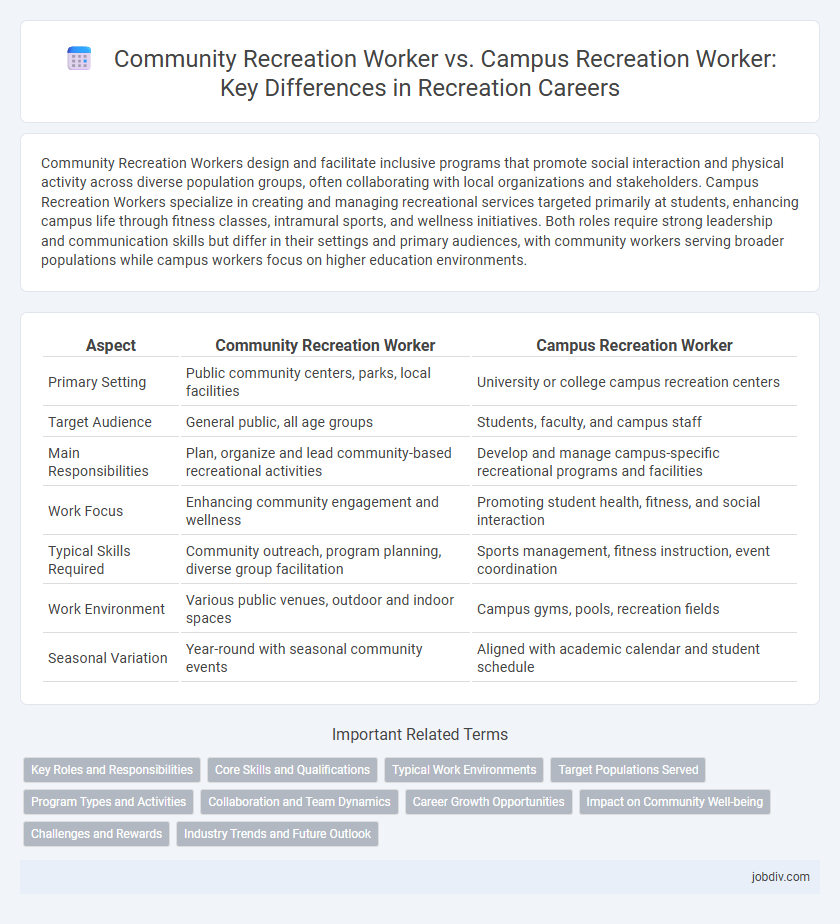Community Recreation Workers design and facilitate inclusive programs that promote social interaction and physical activity across diverse population groups, often collaborating with local organizations and stakeholders. Campus Recreation Workers specialize in creating and managing recreational services targeted primarily at students, enhancing campus life through fitness classes, intramural sports, and wellness initiatives. Both roles require strong leadership and communication skills but differ in their settings and primary audiences, with community workers serving broader populations while campus workers focus on higher education environments.
Table of Comparison
| Aspect | Community Recreation Worker | Campus Recreation Worker |
|---|---|---|
| Primary Setting | Public community centers, parks, local facilities | University or college campus recreation centers |
| Target Audience | General public, all age groups | Students, faculty, and campus staff |
| Main Responsibilities | Plan, organize and lead community-based recreational activities | Develop and manage campus-specific recreational programs and facilities |
| Work Focus | Enhancing community engagement and wellness | Promoting student health, fitness, and social interaction |
| Typical Skills Required | Community outreach, program planning, diverse group facilitation | Sports management, fitness instruction, event coordination |
| Work Environment | Various public venues, outdoor and indoor spaces | Campus gyms, pools, recreation fields |
| Seasonal Variation | Year-round with seasonal community events | Aligned with academic calendar and student schedule |
Key Roles and Responsibilities
Community Recreation Workers organize and facilitate programs that promote social interaction, physical activity, and cultural engagement within neighborhoods and local communities. Campus Recreation Workers focus on developing and managing recreational activities and facilities specifically tailored to the student population, enhancing campus life and student wellness. Both roles require skills in program planning, participant safety, and event coordination, but Community Recreation Workers emphasize broader public outreach, while Campus Recreation Workers specialize in meeting educational institution needs.
Core Skills and Qualifications
Community Recreation Workers require strong interpersonal skills, crisis management abilities, and experience in diverse public program planning to address varied community needs effectively. Campus Recreation Workers emphasize expertise in student engagement, facility management, and collaboration with campus departments to promote health and wellness initiatives. Both roles demand certification in first aid and CPR, solid communication capabilities, and a commitment to fostering inclusive recreational environments.
Typical Work Environments
Community Recreation Workers typically operate in local parks, community centers, and recreational facilities, engaging diverse populations in programs and events that promote wellness and social interaction. Campus Recreation Workers are primarily based within university or college recreation centers, organizing intramural sports, fitness programs, and student events tailored to the campus community. Both roles demand versatility and adaptability to dynamic environments focused on enhancing participant experiences through recreational activities.
Target Populations Served
Community Recreation Workers primarily serve diverse populations across local neighborhoods, including youth, families, seniors, and individuals with disabilities, focusing on inclusive programming that enhances social cohesion and well-being. Campus Recreation Workers target university students and staff, providing fitness, intramural sports, and wellness activities tailored to the academic environment and student lifestyle. Both roles emphasize engagement but differ significantly in demographic focus and program goals.
Program Types and Activities
Community Recreation Workers primarily organize inclusive programs such as youth sports leagues, senior fitness classes, and cultural festivals aimed at promoting social engagement and well-being across diverse populations. Campus Recreation Workers focus on activities tailored to student life, including intramural sports, fitness classes, outdoor adventure trips, and wellness workshops designed to enhance campus engagement and support student health. Both roles emphasize physical activity and social interaction but differ in target audiences and program scope.
Collaboration and Team Dynamics
Community recreation workers excel in fostering collaboration by engaging diverse local groups and coordinating public events that strengthen neighborhood ties. Campus recreation workers prioritize teamwork by organizing student-centered activities and facilitating peer-led programs that enhance campus engagement. Both roles require strong interpersonal skills and adaptability to promote inclusive environments and dynamic team interactions.
Career Growth Opportunities
Community Recreation Workers often have broader career growth opportunities due to their involvement in diverse programming that serves multiple age groups and populations, enhancing leadership and organizational skills applicable across various sectors. Campus Recreation Workers specialize within educational institutions, offering growth primarily linked to higher education administration, student engagement, and wellness program development. Career advancement in community roles may include positions in public parks management or nonprofit leadership, while campus roles often lead to athletic administration or student affairs managerial positions.
Impact on Community Well-being
Community Recreation Workers enhance neighborhood well-being by organizing inclusive programs that promote social interaction, physical activity, and mental health across diverse age groups. Campus Recreation Workers specifically contribute to student well-being, offering targeted fitness and wellness activities that improve academic performance and reduce stress. Both roles significantly foster community health, but Community Recreation Workers have a broader impact on overall public engagement beyond campus boundaries.
Challenges and Rewards
Community Recreation Workers often face challenges such as managing diverse populations and securing funding for public programs, yet they gain rewards through enhanced community engagement and improved public health outcomes. Campus Recreation Workers navigate challenges like scheduling around academic calendars and addressing the recreational needs of a transient student population while benefiting from fostering campus spirit and promoting student wellness. Both roles demand strong interpersonal skills and adaptability, with rewards centered on creating inclusive, active environments that support well-being and social connection.
Industry Trends and Future Outlook
Community recreation workers increasingly emphasize inclusive programming and mental health support, responding to growing public demand for accessible wellness activities. Campus recreation workers focus on technology integration and student engagement through virtual fitness platforms, aligning with trends in higher education's holistic approach to student wellness. Both roles face expanding opportunities due to rising awareness of recreation's role in public health and community cohesion.
Community Recreation Worker vs Campus Recreation Worker Infographic

 jobdiv.com
jobdiv.com